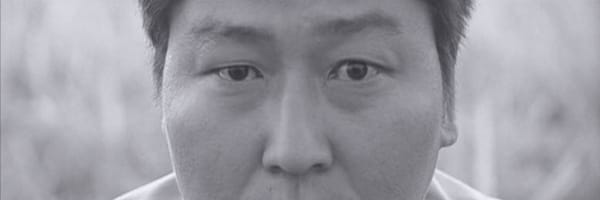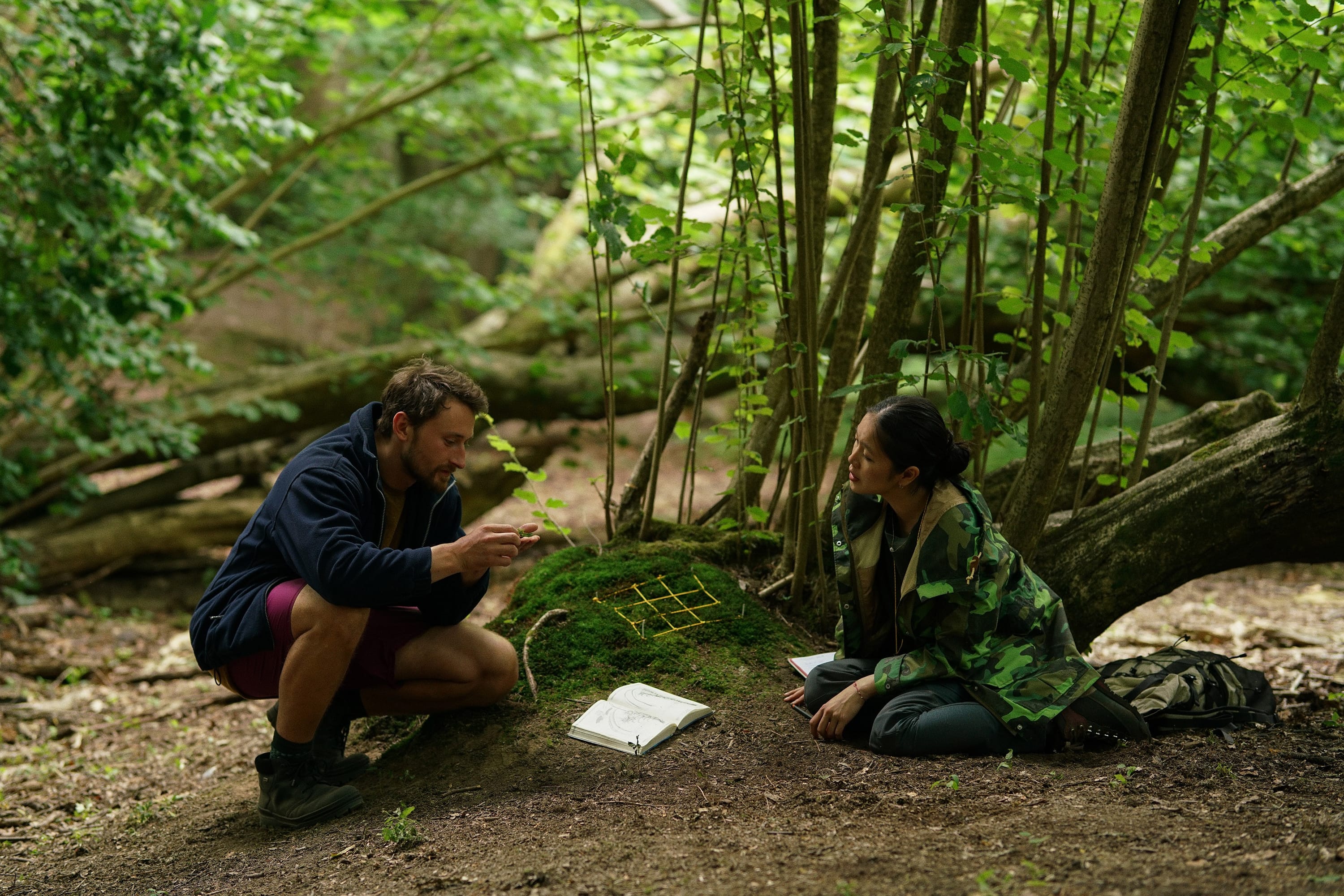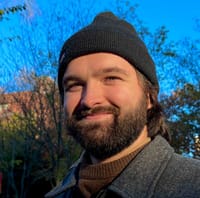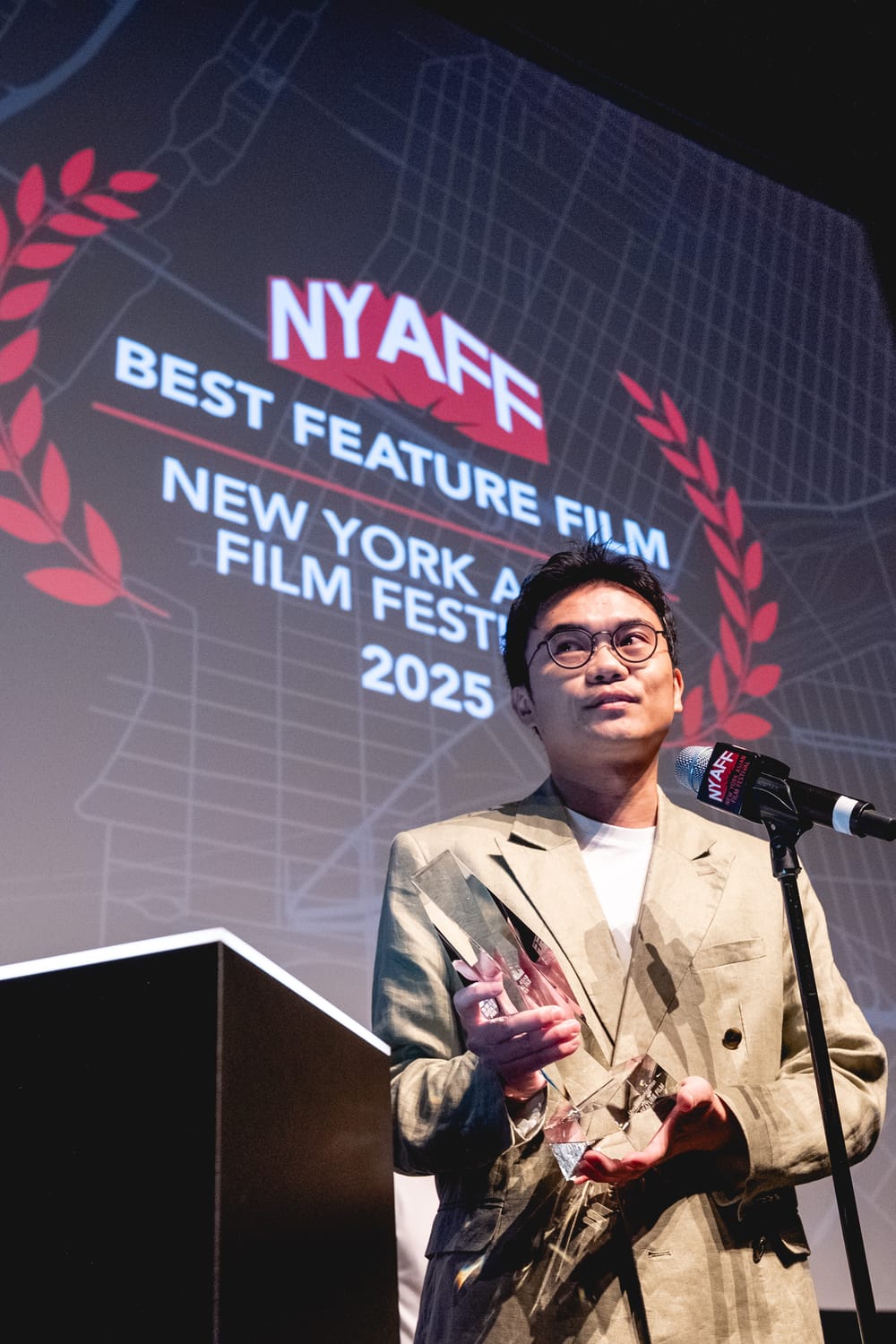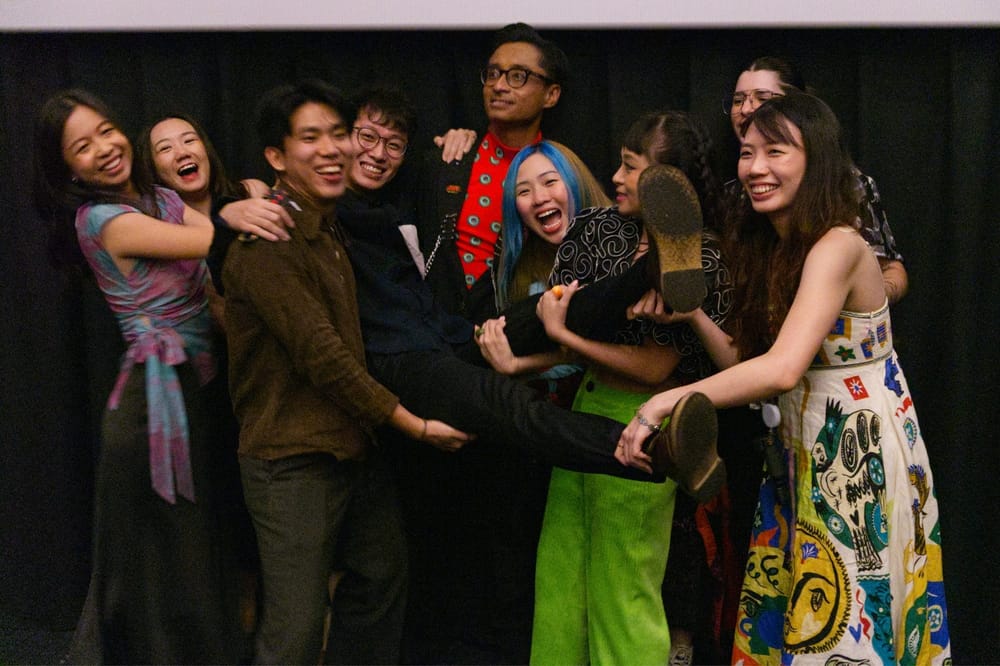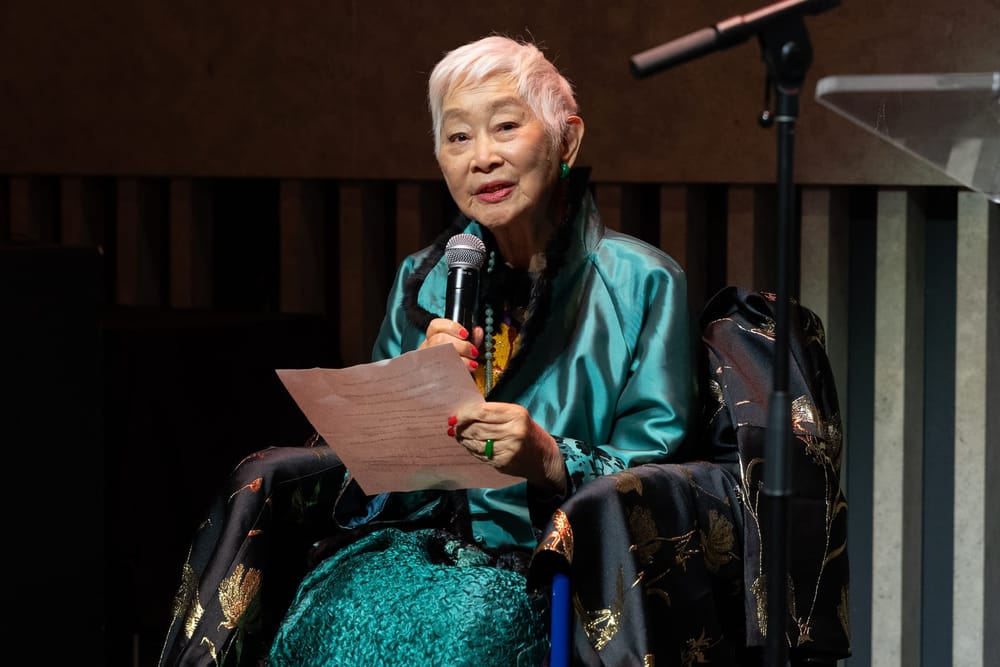By Dylan Foley
Construction worker Stefan (Stefan Gota) empties his fridge for the last time and sets out on a farewell tour across Brussels, sharing bowls of soup with friends as he prepares to return home to Romania for good. This unassuming yet key moment in Bas Devos’ "Here" espouses the importance of a fleeting yet intimate act over any physical souvenir.
Before he sets out for his voyage, Stefan has a string of chance encounters with Shuxiu (Liyo Gong), a Chinese Belgian bryologist who spends her days sampling moss-lined sidewalks and combing the backwoods of her urban home for mutated species. A tacit affinity blooms between the two kindred spirits, interlinking Shuxiu’s moss with Stefan’s soup, as Devos reveals currents of migration overgrown with invisible ecosystems.
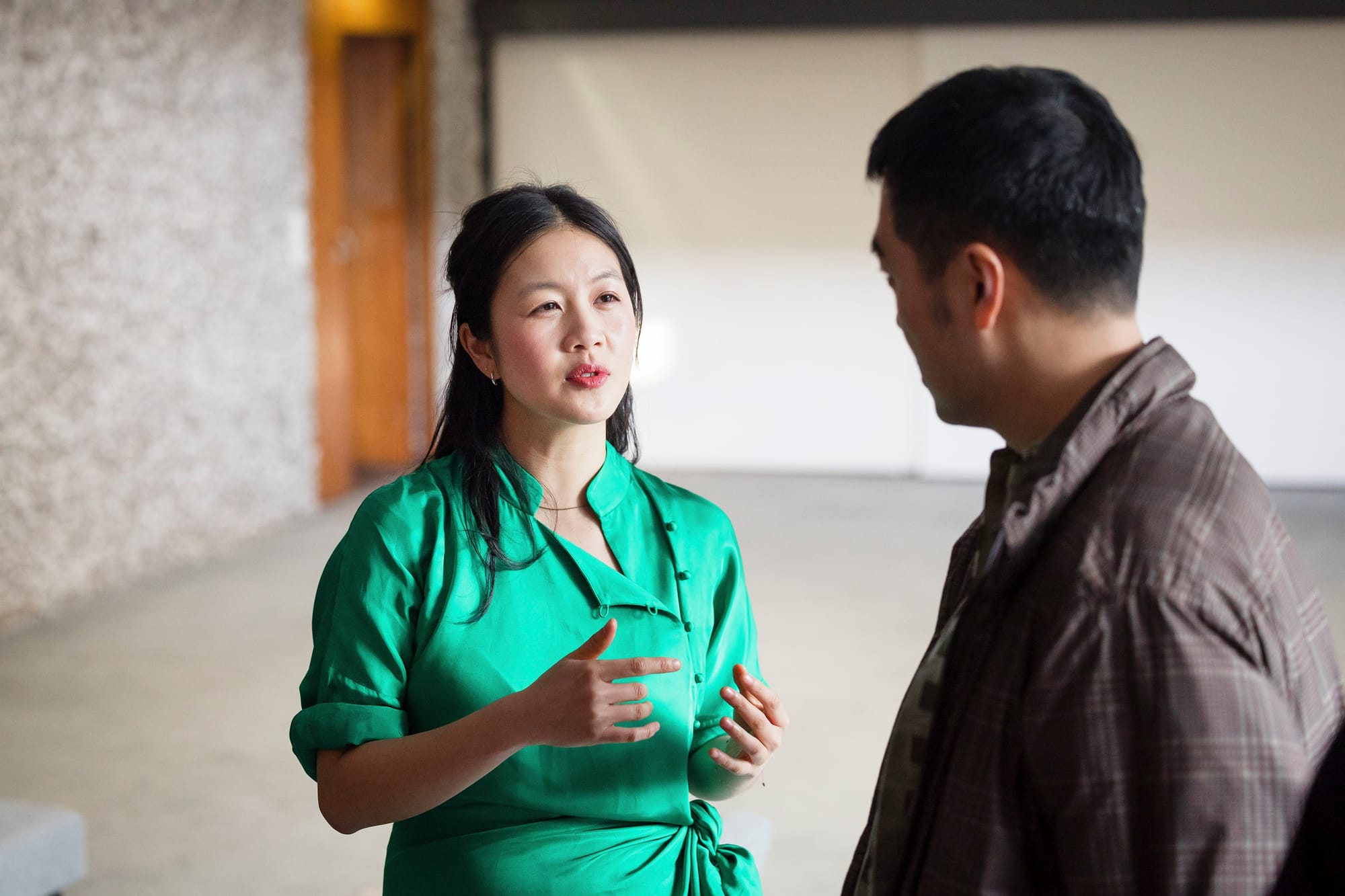
During the film’s premiere at the New York Film Festival (NYFF), Uncaged spoke with Liyo Gong to discuss her transition from being a DJ and film editor — she cut a number of Wang Bing’s films, including "Youth" ("Spring") — to her foray into acting. Gong discussed her portrayal of a second-generation Chinese character and explored Daoist interpretations of fateful meetings.
NYAFF: Can you talk about your experience being cast for Here and how you got involved with the project?
LG: It was my first time acting, but my main gig – I'm usually a film editor. At first I was like, “Oh, I'm not an actress but I'm interested in reading the script,” and Bas wanted my feedback about the character and wanted to know what I thought about the Chinese immigrant experience that he described, since it wasn’t his. And so I went to the audition not realizing it was even a casting, and I had a lot of comments. And then he cast me. I was a bit surprised.
I thought it would be brave of me for once to be on the other side because when I edit I'm really judgy with actors and actresses. I'm a perfectionist when I'm looking into the tempo of the acting and all the small details.
In editing, you can always control the time: you can replay the sequence a thousand times, you can control the rhythm frame by frame; but when you act, you can't stop time. And immediately, when we were trying out some scenes, I could really feel that it was completely different. You have to be in the flow – everything is going to be shown on camera. Your body language is being recorded so you can’t overthink, you have to be in the scene. So it was a great exercise for me.
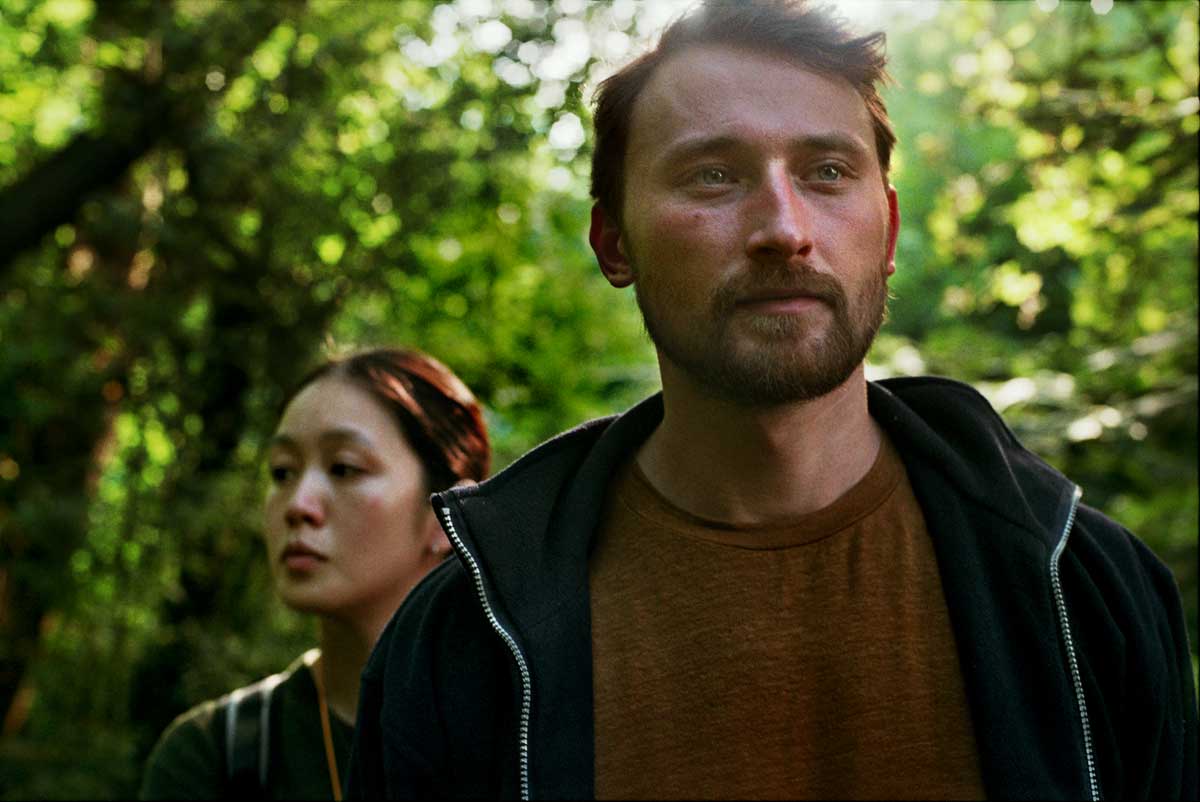
NYAFF: Being on that other side, were you ever consciously thinking about who would be editing your performance?
LG: I was trying not to, but after the cut, I was like, "Oh my god. Dieter (Diependaele) is gonna see this." Because I know Bas' editor, which meant I knew exactly who was gonna look at the take so I thought, "He's gonna hate me," [laughs] because when he was casting me, I was already telling Bas, "I blink a lot. Are you sure you want to cast someone who blinks so much?" And he said, "No, it's perfect for the character." But when we were shooting, Grimm [Vandekerckhove], the DOP (director of photography) said one time, “We have to redo this take because she was blinking way too much” [laughs].
And that's the thing, when you edit, you can browse, scroll, and fast forward through all the takes. But when you have to actually act in them and it's the tenth take, you're physically tired, and you have to reset every time there's action? Yeah, I have a little bit of respect for actors now [laughs]. I already did but now I have more respect.
NYAFF: I know you also DJ. Did acting come naturally to you in some way because of the performance element of DJing? Was there any sort of connection you made between DJing and acting?
LG: That's funny because it's really the opposite for me. For me, DJing is really like editing, but I hate the performative side of it. When I started to DJ, it was by accident. My friends asked me to play music at their exhibition opening.
A friend said, "Come on, you always play music at house parties, you burn all these compilations on CDs for friends, just give it a try," so it started from there and I found it fun. But I DJ like I edit—I really assemble tracks. It’s exactly the same method.
But with the performative side of DJing, I'm really bad. I'm super shy about my body language. I'm super serious, I'm not dancing. My friend says that I look like I'm studying the CDJs and that I should be called “DJ PhD,” or “PhDJ,” because I'm so serious [laughs]. I hate to DJ on a stage, but I love it when the booth is at ground level, when only the people who are in the front can see you and for the rest of the crowd, if they don't look at the DJ, they can dance with each other. And then it's more like you’re providing a soundtrack for people to meet and feel this energy together rather than looking up to someone playing other people's music.
I come from a family of musicians. My parents are violinists, and I played violin when I was four to 18 years old. It's funny because my parents always disliked performances when a violin player overacts on stage to catch the audience's attention. And they would always say, “This is fake (and) this is real.” They could recognize when people overdid it for the sake of the spectacle.
NYAFF: I think your thoughts on music play really well to your character, because your acting was very subtle; there's a lot you have to express through small gestures with Stefan. What was your collaboration with Stefan like in creating this kind of wordless relationship?
LG: It was very natural. It was also wordless [laughs]. I mean, we had a lot of rehearsals. And I think Stefan has this really quiet, calm presence. More than me, I would say. And Bas would just give us indications, but he also let us be a bit on our own. I think the characters are fed from our natural presence a lot. When I showed parts of the film to my friends, they were not really impressed, they were like, “You don't do anything, that's just you” [laughs].
NYAFF: You bring a great introspective feeling to the character. What kind of prep did you do for the role, particularly in playing this person who studies moss?
LG: The thing is, when I got cast, my first reaction was like, "Oh, I don't want to be profiled. Why a Chinese character? Why do you want her to be Chinese? Am I being tokenized?" I was a bit suspicious. It was my first question for Bas. The part was written by a white Belgian guy, and he's asking me to bring my own experience into it, but am I legit enough to do it and to represent others from my community in Belgium?!
That was what I worked on the most because I did connect to the script. And Bas, he works a lot with images and intuition, but he's not the kind of director who will have a very thick theoretical framework. He has very strong intuitions.
He had the idea of a Chinese character; for him, the language was foreign and it felt very ancient but futuristic at the same time...which for me, was not enough [laughs]. I was like, "Yeah, but was she born in Belgium? And why is she working in a restaurant?"
I grew up in a small town in Belgium and on the first day of school with a new teacher, we'd have to fill in a paper with the contact number of our parents and our address. And I remember there was one teacher, he took my paper and as he was reading everyone's aloud, he read mine and said, "Ah! Which restaurant do they work in, your parents?" (That was) in front of everyone. And because my parents are musicians, I was really offended. But then when I think back, for so many kids in this small town, the only migration thread that was accessible for their parents to come to Belgium was to open a restaurant.
It made me think that so many kids must have answered, "Yeah, that restaurant," to the teacher. And that’s something that stuck in my mind when I was thinking about how I was going to represent someone from that community. But it's not that far from me either because my aunt, who also came to Belgium, was studying medicine in China before coming to Europe. And now she does work related to the Chinese community, selling and doing trade with Chinese grocery products. But she also worked in Chinese restaurants in Belgium because she didn't have the chance that my parents had, where with music, they didn't need to speak good French.
When they (my parents) arrived, they didn't speak French, but they could play in an orchestra and assimilate differently. So that's what I told Bas, that a lot of these second-generation Chinese do really well in school and their parents really push them, for the sake of social mobility, to go into scientific studies or become doctors, and I could see that character being believable because I know a lot of those kids and I could also be working in my aunt’s shop. To me it connected something between those two things.
Still, I wanted to add layers, and to find a reason to justify why this character was Chinese. And then actually, I was reading this philosopher Yuk Hui, he's from Hong Kong. He wrote this book called "The Question Concerning Technology in China," and it's an answer to Heidegger's book about the philosophies of science and technology, but seen from the point of view of the philosophical tradition in China. He traces a very different relationship to environment and nature through Daoism and there was so much stuff in it that resonated with Bas' intuitions about a scientist studying moss and nature.
For example, I worked a lot on the translation of the voiceover in the film where she speaks in Chinese and there’s a line she uses that Bas wrote: "I became part of everything because I couldn't name things anymore. I dissolved into everything." The word that they use for “everything” in Chinese is wanwu. And it means 10,000 features. And 10,000 is a number in China that also represents a lot, or forever, or everything. Like when it's someone's birthday, you say, "10,000 years to you so that you live forever."
10,000 things is another concept from the Tao Te Ching: it means everything, it means the universe, but it's composed of the 10,000 things that you can name. I found it super important because there's this concept of naming things, but with the concept of 10,000 things, they're all interconnected. And it's a very holistic vision.
NYAFF: And there's also a power in her when it comes to forgetting the names of things and becoming part of it instead.
LG: Yes and for me it was a super strong connection. I was super annoying [laughs], I was like, "Bas! Bas! This word! Wanwu! It's super important! You have to change the title!" And Bas was like, "Yeah..."
For me though, it was perfect. The idea that all these things in the universe are all connected and that they form everything. And how she drifts into giving up to that—for me it really justified that this voiceover should be in Chinese.
Another concept that helped me think about the film is the concept of yuanfen, which is something that's also non-translatable. It's a word that describes a mix between serendipity, fate and coincidence. It's the link that's between people, and how many chances you have to meet someone else in this life is determined by your past lives. So there's this saying—but there is a movie recently, Past Lives?
NYAFF: They call it inyeon, yeah?
LG: Right, it's the same and she's like, "It's a pickup line" [laughs]. But it's this idea where you need 10,000 lives, 10,000 reincarnations from your past lives to meet a person in this life. And in my family, it runs really deep. They went through the Sino-Japanese war, the Cultural Revolution, and their life path changed from day to night. They would get transferred from certain parts of the country to other parts, decided by someone above them. And then my grandparents would just say, "It's yuanfen. It's like that." I think they would say that because it was so random and unstable, the destinies of people during the turmoil of the early 20th century.
My grandma, she comes from the Northern part of China and she met my grandfather in the South because she had to flee the North for certain reasons. And then from the South, they fled to another place and she was like, "Imagine China is so big, and out of all the people in China, I meet the man who is the furthest from me, in Fujian. It means that we had an invisible rope that was tying us. And it's yuanfen.” And that's how she would always explain it to me, that if you have something to do with someone you will come across each other.
And if you have nothing to do with someone—you might take the same bus every day, sitting next to them—it’s because it's written. But what I love about yuanfen is that there’s also agency, because it's not just determinism like, "It's meant to be like this." You have to be able to catch the signs and to make sense of them. That's why serendipity is when you find something that you're not looking for.
NYAFF: Is there anything you’ll bring back to editing and DJing that you learned from your first time acting?
LG: I just want to work outdoors more. [laughs] Because it was so nice to be in the forest and looking at moss under the sun and getting paid for that. With DJing and editing I'm always in a dark room. Maybe I made the wrong career choice. [laughs] That's what I’ll take with me.

